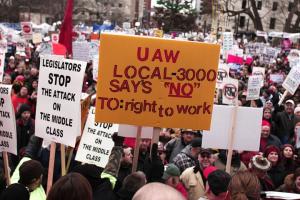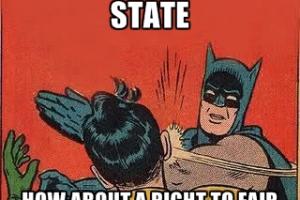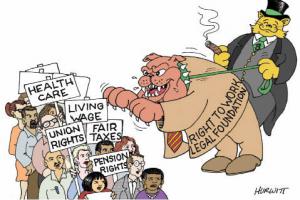Maine State House Kills “Right To Work” Legislation Prohibiting Employment Conditional on Payment of Union Dues
MaineWire
 Labor sould figtt the proposed National RIght to Work Law. But it is more imortant to continue to build alliances among other progressive groups to fight other reforms that have a serious chance of passage. In particular, labor should put its resources into organizing government workers who are under attack on all sides.
Labor sould figtt the proposed National RIght to Work Law. But it is more imortant to continue to build alliances among other progressive groups to fight other reforms that have a serious chance of passage. In particular, labor should put its resources into organizing government workers who are under attack on all sides.
 Last week, the Republican-controlled legislature in West Virginia overrode a veto by Democratic Gov. Earl Ray Tomblin, making the measure officially law. The story of how West Virginia got to that point is a boiled-down version of the changes America has undergone over the past half-century — the pain of de-industrialization, the shift in political power, the casting about for anything that might create jobs.
Last week, the Republican-controlled legislature in West Virginia overrode a veto by Democratic Gov. Earl Ray Tomblin, making the measure officially law. The story of how West Virginia got to that point is a boiled-down version of the changes America has undergone over the past half-century — the pain of de-industrialization, the shift in political power, the casting about for anything that might create jobs.
 The court case could pose a major threat to public-sector unions whose clout grew in the 1970s after the high court upheld laws requiring all employees who benefit from collective bargaining to contribute to the union. Although teachers and other public workers may refuse to pay dues used to support a union's political activities, they can still be forced to pay a so-called "fair share" fee that covers operation costs.
The court case could pose a major threat to public-sector unions whose clout grew in the 1970s after the high court upheld laws requiring all employees who benefit from collective bargaining to contribute to the union. Although teachers and other public workers may refuse to pay dues used to support a union's political activities, they can still be forced to pay a so-called "fair share" fee that covers operation costs.
 If the U.S. Supreme Court rules in favor of a lawsuit filed by the National Right to Work Legal Defense Foundation, every state in the country would essentially turn into an anti-union "right to work" state, which would be a significant blow to public sector unions' collective bargaining efforts and also complicate thousands of existing contracts between organized workers and municipalities, cities, counties, and states across the country.
If the U.S. Supreme Court rules in favor of a lawsuit filed by the National Right to Work Legal Defense Foundation, every state in the country would essentially turn into an anti-union "right to work" state, which would be a significant blow to public sector unions' collective bargaining efforts and also complicate thousands of existing contracts between organized workers and municipalities, cities, counties, and states across the country.
 A decision in favour of Pamela Harris in the Harris v. Quinn case before the U.S. Supreme Court would seriously impact the quality of care provided to tens of thousands of seniors and people with disabilities who use state-supported home care services.
It would do this by ruling the collective agreement covering more than 27,000 workers unconstitutional. More broadly, a ruling that the current system is unconstitutional threatens the future of collective bargaining.
A decision in favour of Pamela Harris in the Harris v. Quinn case before the U.S. Supreme Court would seriously impact the quality of care provided to tens of thousands of seniors and people with disabilities who use state-supported home care services.
It would do this by ruling the collective agreement covering more than 27,000 workers unconstitutional. More broadly, a ruling that the current system is unconstitutional threatens the future of collective bargaining.
Spread the word